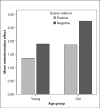Mood, motivation, and misinformation: aging and affective state influences on memory
- PMID: 22059441
- PMCID: PMC3915354
- DOI: 10.1080/13825585.2011.622740
Mood, motivation, and misinformation: aging and affective state influences on memory
Abstract
Normative age differences in memory have typically been attributed to declines in basic cognitive and cortical mechanisms. The present study examined the degree to which dominant everyday affect might also be associated with age-related memory errors using the misinformation paradigm. Younger and older adults viewed a positive and a negative event, and then were exposed to misinformation about each event. Older adults exhibited a higher likelihood than young adults of falsely identifying misinformation as having occurred in the events. Consistent with expectations, strength of the misinformation effect was positively associated with dominant mood, and controlling for mood eliminated any age effects. Also, motivation to engage in complex cognitive activity was negatively associated with susceptibility to misinformation, and susceptibility was stronger for negative than for positive events. We argue that motivational processes underlie all of the observed effects, and that such processes are useful in understanding age differences in memory performance.
Figures
References
-
- Adams C. Qualitative age differences in memory for text: A life-span developmental perspective. Psychology and Aging. 1991;6:323–336. doi: 10.1037/0882-7974.6.3.323. - PubMed
-
- Bohanek JG, Fivush R, Walker E. Memories of positive and negative emotional events. Applied Cognitive Psychology. 2005;19:51–66. doi: 10.1002/acp.1064.
-
- Cacioppo JT, Petty RE, Kao CF. The efficient assessment of need for cognition. Journal of Personality Assessment. 1984;48:306–307. doi: 10.1207/s15327752jpa4803_13. - PubMed
-
- Cacioppo JT, Petty RE, Feinstein JA, Jarvis WBG. Dispositional differences in cognitive motivation: The life and times of individuals varying in need for cognition. Psychological Bulletin. 1996;119:197–253. doi: 10.1037/0033-2909.119.2.197.
-
- Carstensen LL, Isaacowitz DM, Charles ST. Taking time seriously: A theory of socioemotional selectivity. American Psychologist. 1999;54:165–181. doi: 10.1037/0003-066X.54.3.165. - PubMed
Publication types
MeSH terms
Grants and funding
LinkOut - more resources
Full Text Sources
Medical

